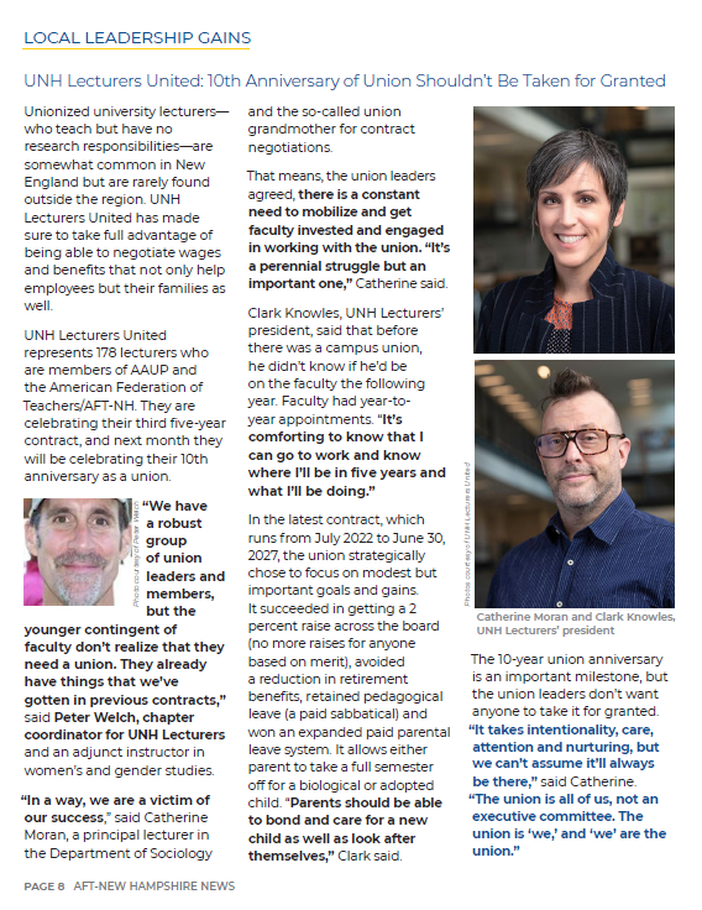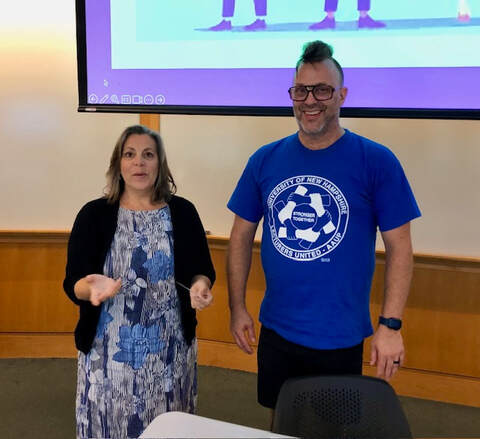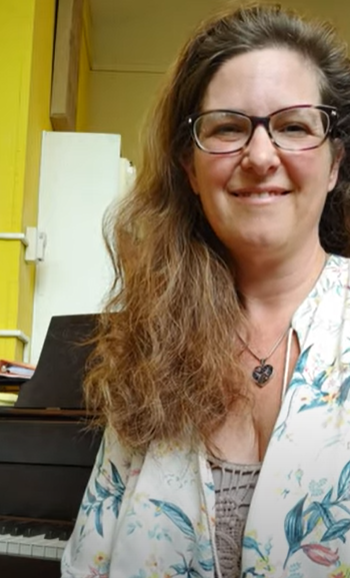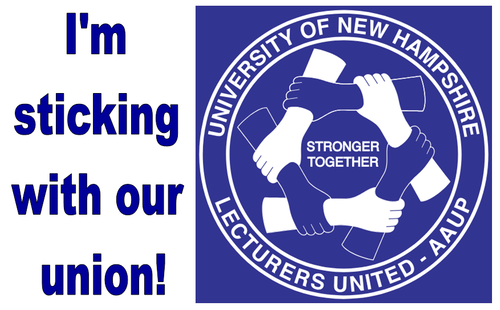AFT New Hampshire News, Winter 2024
Faculty Concerns: Budget and Staff Cuts
Please share any work issues or concerns related to the recent budget and staff cuts. Your name or email are not required, and responses will be sent only to the Lecturers United Chapter Coordinator.
Donna and Clark, meeting new Lecturers at the New Faculty Orientation, 2023-24
Donna Schefer, Executive Committee Secretary
Principal Lecturer, Communication Sciences and Disorders
Clark Knowles, Executive Committee President
Principal Lecturer, English
A statement from Plymouth State University - AAUP
Public Education, Public Good
January 23, 2023
PSU-AAUP advocates for access to the benefits of quality higher education for all New Hampshire citizens. We enthusiastically support requests to the legislature for specific additional budgeted funds to support public higher education through the University System of New Hampshire.
We affirm that:
Public Universities are a Public Good as well as an Individual Good
- An educated citizenry is a key contributor to innovation, creativity, well-being and growth more broadly.
- An educated citizenry benefits school districts, towns, philanthropic organizations, and the whole state.
- An educated citizenry is a key contributor to an infrastructure supporting private and public industry and commerce.
“Through volunteer work, leadership, and philanthropic contributions, public university graduates enrich the civic and economic life of their communities. They also contribute more in taxes and are less reliant on government services than their peers whose highest degree is a high school diploma.” (Association of Public & Land Grant Universities)
Regional public universities “may impact local economic outcomes, such as industrial composition, in ways that increase the return to education in the local community, and this may increase high school and college attainment. Regional universities may also affect other characteristics of the local community, such as the income distribution or family composition, which may affect mobility directly or indirectly, for example through affecting primary and secondary school quality.” (“Workhorses of Opportunity: Regional Universities Increase Local Social Mobility”, 2022, from the Institute of Labor Economics, p 34)
Public Universities are a Vital and Sensible Investment of Public Funds
College graduates “contribute hundreds of thousands of dollars more toward government services and social insurance programs and college graduates “rely much less on other taxpayers.” (Lumina Foundation)
Well-funded public universities encourage young adults to “stay, work, play” in New Hampshire rather than head elsewhere for less-expensive education, never to return.
“The relatively high cost of public higher education in New Hampshire is likely due in part to comparatively low levels of state support for institutions of higher education, and in turn may result in more Granite State high school students leaving New Hampshire for other educational opportunities than would have with the option of lower in-state tuition.” (New Hampshire Business Review, 2022)
“Given the demographic trends that are impacting and will continue to impact New Hampshire’s economy and labor force, retaining young workers in the state is key for the state’s economic vibrancy and the future prosperity of all Granite Staters.” (New Hampshire Business Review, 2022)
Increased and sustained funding to USNH at the state level will:
- Allow universities to reduce tuition costs for New Hampshire students and their families
- Maintain/increase educational quality by attracting and retaining students, faculty and staff
- Support innovation without sacrificing overall access, quality, and diversity of educational opportunities
- Enable multi-year planning by faculty, staff, and administration who are currently consumed by juggling insufficient available resources just to stay afloat.
An equitably compensated, less-contingent, more secure workforce of staff and faculty is vital to supporting our students, to carrying out even our most simple plans, sustaining them over time, and evaluating measurable outcomes. And these faculty and staff want and need to be meaningfully involved in the structures of governance and decision-making that can enable or undermine our best efforts to realize our shared aspirations.
“Submitting public universities to private sector standards hasn’t increased their overall wealth and made their education more efficient. It has increased their costs and shifted resources from the educational core. I show how privatizing public colleges has made them more expensive for students and impaired students’ learning. Private sector “reforms” are not the cure for the college cost disease–they are the college cost disease. They set up a devolutionary cycle that shifts resources away from education while raising rather than containing costs.” (The Great Mistake, Christopher Newfield)
In affirming our shared belief that public higher education is a public good and therefore a sensible investment of public funds, we encourage New Hampshire residents to join us in urging the legislature and the governor to increase and sustain funding to the USNH.
These are difficult times for public higher education. But we remain optimistic when we imagine what would be possible if funding more accurately matched the high value of public higher education to all of us.
For more information about Plymouth State University - AAUP, go to: plymouth-aaup.org/
WHAT HAS YOUR UNION
DONE FOR YOU LATELY?
Nena Stracuzzi, Lecturer, Sociology
UNHLU-AAUP, Former Vice President
Turns out, plenty. Thanks to the blood, sweat, and tears of many who came before me, in August of 2015, after fourteen months of negotiations, we signed our first collective bargaining agreement. And with significant gains from those efforts, we as a group have come a long way since 2013. I, for one, am grateful.
For starters, we’ve received double digit average percentage raises in all colleges for the period from 2015-2017. We’ve also received summer and J-Term compensation increases. We now have a university wide promotion structure and we eagerly await news of those who have submitted promotion packets. This is on the heels of many lecturers’ rank adjustments to Senior or Principal. We’ve achieved longer-term appointments and we finally have a grievance structure to address cases of arbitrary or capricious treatment, adding yet another layer of protection. Such enhanced job security was among our members’ top priorities. Significantly, like our tenured colleagues, we now have the opportunity to take a paid semester for professional development. These pedagogical leaves which provide us with much-needed time to increase our teaching effectiveness, whether to develop new courses or explore new technologies, are a monumental boon for lecturer faculty. Additionally, all lecturers are entitled to request funds annually for registration and travel to professional organizations, conferences, and/or workshops. Importantly, twelve weeks of paid parental leave were negotiated and finally, sick days for personal or family leave is contractually guaranteed. So too are the full protections of academic freedom guaranteed for lecturers. Truly, substantial advances have been made; while we may not yet have achieved all for which we collectively hope, we enter our second round of negotiations from a position of strength. With previous successes under our belts and only continued advancements to be made, the importance of collective bargaining is apparent. Such achievements for all could never have been made individually.
UNHLU-AAUP, Former Vice President
Turns out, plenty. Thanks to the blood, sweat, and tears of many who came before me, in August of 2015, after fourteen months of negotiations, we signed our first collective bargaining agreement. And with significant gains from those efforts, we as a group have come a long way since 2013. I, for one, am grateful.
For starters, we’ve received double digit average percentage raises in all colleges for the period from 2015-2017. We’ve also received summer and J-Term compensation increases. We now have a university wide promotion structure and we eagerly await news of those who have submitted promotion packets. This is on the heels of many lecturers’ rank adjustments to Senior or Principal. We’ve achieved longer-term appointments and we finally have a grievance structure to address cases of arbitrary or capricious treatment, adding yet another layer of protection. Such enhanced job security was among our members’ top priorities. Significantly, like our tenured colleagues, we now have the opportunity to take a paid semester for professional development. These pedagogical leaves which provide us with much-needed time to increase our teaching effectiveness, whether to develop new courses or explore new technologies, are a monumental boon for lecturer faculty. Additionally, all lecturers are entitled to request funds annually for registration and travel to professional organizations, conferences, and/or workshops. Importantly, twelve weeks of paid parental leave were negotiated and finally, sick days for personal or family leave is contractually guaranteed. So too are the full protections of academic freedom guaranteed for lecturers. Truly, substantial advances have been made; while we may not yet have achieved all for which we collectively hope, we enter our second round of negotiations from a position of strength. With previous successes under our belts and only continued advancements to be made, the importance of collective bargaining is apparent. Such achievements for all could never have been made individually.



